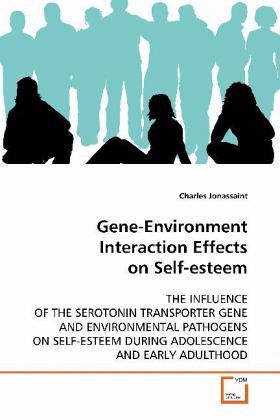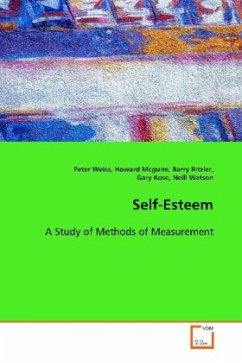
Gene-Environment Interaction Effects on Self-esteem
THE INFLUENCE OF THE SEROTONIN TRANSPORTER GENE AND ENVIRONMENTAL PATHOGENS ON SELF-ESTEEM DURING ADOLESCENCE AND EARLY ADULTHOOD
Versandkostenfrei!
Versandfertig in 6-10 Tagen
45,99 €
inkl. MwSt.

PAYBACK Punkte
23 °P sammeln!
Self-esteem is a well-studied construct that has beenassociated with a myriad of behavioral,psychological and physical health outcomes. Theliterature suggests that social support,socioeconomic status (SES), parental factors,maltreatment and stressful life events may influenceself-esteem level and trajectory. There is alsoevidence for a heritable component of self-esteem.Although no large molecular genetic studies onself-esteem exist, associated personality traitneuroticism and related facets depression and anxietyhave been linked to a polymorphism of the serotonintransporter gene (5HTTLPR). Th...
Self-esteem is a well-studied construct that has been
associated with a myriad of behavioral,
psychological and physical health outcomes. The
literature suggests that social support,
socioeconomic status (SES), parental factors,
maltreatment and stressful life events may influence
self-esteem level and trajectory. There is also
evidence for a heritable component of self-esteem.
Although no large molecular genetic studies on
self-esteem exist, associated personality trait
neuroticism and related facets depression and anxiety
have been linked to a polymorphism of the serotonin
transporter gene (5HTTLPR). Therefore, the 5HTTLPR
may also be associated with self-esteem. This book
reviews the literature surrounding gene-environment
interactions and examines the effects of known
environmental risk factors in childhood, the 5HTTLPR,
and their interaction on self-esteem in early adulthood.
associated with a myriad of behavioral,
psychological and physical health outcomes. The
literature suggests that social support,
socioeconomic status (SES), parental factors,
maltreatment and stressful life events may influence
self-esteem level and trajectory. There is also
evidence for a heritable component of self-esteem.
Although no large molecular genetic studies on
self-esteem exist, associated personality trait
neuroticism and related facets depression and anxiety
have been linked to a polymorphism of the serotonin
transporter gene (5HTTLPR). Therefore, the 5HTTLPR
may also be associated with self-esteem. This book
reviews the literature surrounding gene-environment
interactions and examines the effects of known
environmental risk factors in childhood, the 5HTTLPR,
and their interaction on self-esteem in early adulthood.












